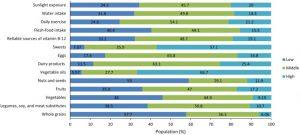The adoption of a healthy lifestyle can lead to significant improvements in physical and mental health. While vegetarian diets are often associated with health benefits, few studies have focused on their impact on university students. This study analyzed adherence to a healthy lifestyle among vegetarian and non-vegetarian university students in Peru, providing insights into how diet choices correlate with overall lifestyle habits.
Additional read: Vegan Diet Health Benefits in Metabolic Syndrome
This cross-sectional study surveyed 6,846 Peruvian university students across three geographical regions. Researchers collected data using the Diet and Healthy Lifestyle Scale (DEVS) and the Vegetarian Lifestyle Index (VLI), evaluating dietary patterns and lifestyle habits such as physical activity, sunlight exposure, and water consumption. BMI was calculated based on self-reported height and weight to identify any associations between diet, lifestyle, and body composition.
The results revealed that vegetarian students had a higher adherence to a healthy lifestyle compared to their non-vegetarian peers. Specifically, vegetarian and semi-vegetarian participants exhibited lower BMI values, with a higher incidence of normal and underweight categories, whereas overweight and obese students predominantly adhered to non-vegetarian diets. Healthy lifestyle scores also varied by gender and age, with male and younger students reporting greater adherence.

Fig 1. Distribution of DEVS among Peruvian university students. Note: Each color line shows the frequency of the lifestyle habit, as level of sunlight exposure, duration or consumption is represented as dark blue for “Low,” light green for “Middle,” and light blue for “High”.
Vegetarian diets appeared to influence lifestyle positively, as these students reported higher scores in healthy practices like moderate exercise, hydration, and minimal consumption of sweets. However, across the study population, health behaviours like sunlight exposure and consumption of plant-based foods were generally inadequate.
The university environment often poses challenges to maintaining a healthy lifestyle. Increased independence in food choices, a high prevalence of sedentary behaviours, and exposure to fast-food culture can hinder students’ adherence to healthy practices. Interestingly, Protestant students, likely influenced by the health-oriented values of the Seventh-day Adventist church, showed a higher likelihood of following a vegetarian diet, aligning with the religious institution’s promotion of plant-based dietary practices.
This study suggests that vegetarian diets, when well-balanced, may benefit young adults, supporting health by potentially reducing the risk of non-communicable diseases. However, a vegetarian diet alone does not ensure a healthy lifestyle; additional factors such as regular physical activity, hydration, and reduced sugar intake play crucial roles. The findings also indicate that while many students recognize the importance of a healthy diet, consistent adherence remains limited.
The data indicate that while Peruvian vegetarian students display greater adherence to healthy lifestyle habits, there is still a need for interventions in the university setting to encourage healthy choices across all dietary groups. Future studies should address barriers to accessing plant-based foods, the cost of a vegetarian diet, and its potential nutritional deficiencies.
Journal article: Saintila, J., Rojas-Humpire, R., Newball-Noriega, E.E., Huancahuire-Vega, S., Ignacio-Cconchoy, F.L. and Calizaya-Milla, Y.E. (2024). Analysis of adherence to a healthy lifestyle among vegetarian and non-vegetarian Peruvian university students: A cross-sectional survey. PloS One.
Summary by Faith Oluwamakinde










